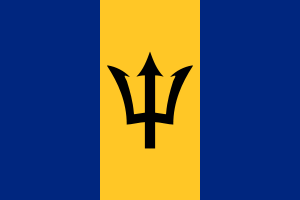Minister of the Crown
Minister of the Crown is a formal constitutional term used in the Commonwealth realms to describe a minister to the reigning sovereign. The term indicates that the minister serves at His/Her Majesty's pleasure, and advises the monarch, or viceroy, on how to exercise the Crown prerogatives relative to the minister's department or ministry.
Ministries
Though the sovereign or viceroy is typically advised by a larger body known as a privy council or executive council, in practice it is a subset of the council, the collective body of ministers of the Crown, called the Ministry, which directly guides the monarch and/or governor. The Ministry should not be confused with the Cabinet, as ministers of the Crown may exist outside of this committee. The following are the present ministries of some of the Commonwealth realms, which list the incumbent ministers of the Crown.
-
 71st Australian Ministry
71st Australian Ministry -
 6th Barbadian Ministry
6th Barbadian Ministry -
 96th British Ministry
96th British Ministry -
 29th Canadian Ministry
29th Canadian Ministry -
 14th New Zealand Ministry
14th New Zealand Ministry
History
The root of the presence of Crown ministers in the Commonwealth realms lies in early modern England, where monarchs sometimes employed "cabinet councils", which consisted of ministers who advised the monarch and implemented his decisions. The term minister came into being as the sovereign's advisors ministered, or served, the will of the king. Over time, former ministers and other distinguished persons were retained as peripheral advisors with designated ministers having the direct ear of the king; this led to the creation of the larger Privy Council, with the Cabinet becoming a committee within that body, made up of appointed ministers.
For a period between the accession of King James VI of Scotland to the throne of England in 1603 and the unification of Scotland and England in 1707, when the two states were in personal union, one monarch was advised by two separate sets of ministers of the Crown for each country. As the English overseas possessions and later British Empire expanded, the colonial governments remained subordinate to the imperial government at Westminster, and thus the Crown remained ministered only by the Imperial Privy Council, made up of British Ministers of the Crown. When Canada became a Dominion in 1867, however, a separate Canadian Privy Council was established to advise the Governor General on the exercise of the Crown prerogative, although the viceroy remained an agent of the British government at Whitehall.
After that date, other colonies of the empire attained Dominion status and similar arrangements were made. Following the passage of the Statute of Westminster in 1931, however, the empire was divided into autonomous kingdoms under one sovereign, thus returning the monarch to a position similar to that which existed pre-1707, where he or she was ministered by separate cabinets for each respective country. Thus, today no minister of the Crown in any Commonwealth realm can advise the monarch to exercise any powers pertaining to any of the other countries.
See also
- Monarchy of Antigua and Barbuda
- Monarchy of Australia
- Monarchy of The Bahamas
- Monarchy of Barbados
- Monarchy of Canada
- Monarchy of the Cook Islands
- Monarchy of Jamaica
- Monarchy of New Zealand
- Monarchy of the Solomon Islands
- Monarchy of the United Kingdom